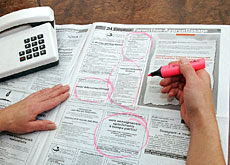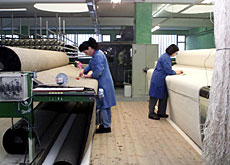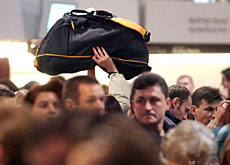Switzerland looks abroad for brain gain

The number of well-qualified foreigners coming to work in Switzerland is on the rise, according to government figures.
Almost 60 per cent of foreigners taking up posts over the past two years hold a university degree or similar qualification.
The influx of an educated workforce comes at a time when some sectors of the Swiss economy – especially science and technology – are complaining of a native brain drain.
“In the past few years there’s been a shortage of qualified personnel in Switzerland,” Kurt Rohner of the Swiss foreign ministry told swissinfo.
According to the Federal Statistics Office, which released the figures on Monday, there has been a marked increase in the number of university-educated workers from abroad.
Ten years ago, only 19 per cent of foreign workers living in Switzerland had been to university.
Rainer Winkelmann, professor for statistics and empirical economic research at the University of Zurich, sees the trend towards hiring more educated workers as a positive one.
“This is a real paradigm shift for Switzerland. It shows that this country is successful in competing for highly qualified employees, and there is a shortage of such people worldwide,” he said.
Foreign workforce
The Federal Statistics Office counted 809,000 foreign workers – roughly one-fifth of the working population – in the second quarter of 2003. This was 2.5 per cent fewer than in the previous year.
The figure does not include the 250,000 cross-border commuters, seasonal workers or asylum seekers. The Travail.suisse labour federation adds that less than one in four foreign workers needs a work permit.
The majority of employees from abroad – around 60 per cent – come from European Union or European Free Trade Association member countries.
Italians make up the largest group of foreign workers in Switzerland (174,000), closely followed by people from the Balkans (167,000).
About 78 per cent of foreign workers arriving in Switzerland over the past two years ended up in the service sector.
“Switzerland is competing with other European countries as well as the United States, Canada and New Zealand to attract qualified personnel,” Winkelmann told swissinfo.
“This new data shows that Switzerland is an attractive country to work and live.”
swissinfo, Karin Kamp
174,000 Italians, 85,000 Portuguese and 79,000 Germans work in Switzerland.
About 167,000 are of Balkan origin.
About 57 per cent of foreign workers who came to Switzerland in the last two years have completed a university education.
Around one-fifth of Switzerland’s workforce are foreign.
On June 1, 2002, the first set of bilateral agreements between Switzerland and the EU came into force. They included an agreement on the free movement of people.
As of June 1, 2004, Swiss nationals will no longer have preference over EU citizens on the Swiss job market.
To evaluate the effects of the free movement of people accord on the Swiss employment market, 15,000 foreigners were polled all over Switzerland.

In compliance with the JTI standards
More: SWI swissinfo.ch certified by the Journalism Trust Initiative



You can find an overview of ongoing debates with our journalists here. Please join us!
If you want to start a conversation about a topic raised in this article or want to report factual errors, email us at english@swissinfo.ch.